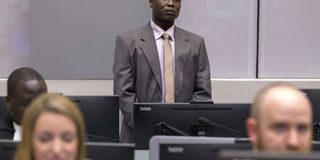Sejusa, Besigye videos played for ICC judges

Trial. Former LRA commander Dominic Ongwen before the ICC in the Hague, Netherlands, on January 21, 2016. AFP PHOTO
What you need to know:
- The charges. Ongwen is facing 70 counts of war crimes and crimes against humanity, which were confirmed in March 2016 following a pre-hearing.
- The prosecution team led by Ms Fatou Bensouda, the ICC chief prosecutor, lined a total of 116 witnesses who testified against the former rebel leader.
- The ex-LRA commander is accused of commanding attacks on Pajule, Abok, Lukodi and Odek Internally Displaced People’s camps in Gulu and Oyam districts between July 2002 and December 2005.
THE HAGUE. A lawyer for Dominic Ongwen, on Tuesday began defence of the ex-Lord’s Resistance Army (LRA) commander by playing for International Criminal Court (ICC) judges a video in which former spymaster, Gen David Sejusa, blames government for the northern Uganda war.
In the video, Gen Sejusa is captured saying some UPDF soldiers during the anti-LRA offensive dug holes and trenches (locally called andaki) in which they burned civilians.
“For (President) Museveni, everything is about his power and anyone who challenges it, you are his enemy. If you hate people, you don’t dehumanise them for 27 years,” said Gen Sejusa, a former coordinator of Uganda’s Intelligence Services.
Defence attorney Krispus Ayena did not disclose the source of the footage or when it was recorded, but Gen Sejusa was in civilian attire, raising a possibility that he may have made the comments after falling out with the Ugandan government.
Sejusa, originally named David Tinyefuza, was a top commander of National Resistance Army (NRA), the precursor to UPDF, in the fighting against the Joseph Kony-led insurgents. He gained notoriety for allegedly superintending a scorched earth policy during Operation North, an anti-LRA offensive he commanded.
Sejusa’s role
That almost two-decade war, according to what Sejusa said, became a cash cow for military commanders some of whom intentionally created ghost soldiers to profiteer by pocketing salaries on non-existent troops.
“A full (UPDF) brigade like 305 had only three people; that is the commander and his assistants. So these people could get money for a full brigade and yet some of them had only three people. So this war became a cash-cow and nobody wanted it stopped quickly,” he said in the video clip played at the ICC yesterday.
He in the video also disclosed a hatred for certain groups of people in northern Uganda.
Lawyer Ayena yesterday seized on those comments to frame the LRA war as a consequence of a government-fanned north-south divide, fuelled by resentment particularly in Buganda whose kingdom former President Milton Obote abolished following the 1966 crisis.

Veteran opposition politician, Dr Kizza Besigye and former spymaster, Gen David Sejusa
He then argued in the context that Ongwen was a victim of circumstance and additionally remained under the spell of LRA commander Kony believed to possess mystical powers.
“It is unfortunate that this former child soldier (Ongwen) is here in the dock instead of the government soldiers. He should have been the last person to be brought to court,” Mr Ayena said, referring to the former commander of the rebel group’s powerful Sinai brigade.
Kony told Ongwen and other rebel recruits, Mr Ayena told court, that President Museveni and UPDF soldiers, and not civilians, were their “main enemies”.
The indoctrination and brutal treatment of escapees rendered LRA rebels most vulnerable to Kony’s whims, he argued.
Mr Ayena told court that the UPDF soldiers would disguise as insurgents and commit crimes, and he questioned why prosecution did not indict Uganda government soldiers.
He argued that since Kony’ s orders could not be disobeyed, there was no way Ongwen could have killed or burnt alive civilians at various internally displaced people’s camps as claimed by the prosecution in its indictment.
Ongwen, who is facing 70 counts of war crimes and crimes against humanity, listened in silenced. He was smartly dressed in a black suit, white shirt and a red neck tie.
Another video clip played out yesterday at the ICC was one in which veteran opposition politician, Dr Kizza Besigye, was captured saying that there has never been peaceful transfer of power in Uganda with each president bombed out by the successor.
The defence team played out this clip to show how Uganda is politically unstable.
Mr Ayena faulted prosecution evidence, saying no ballistic evidence was presented to prove whether bullets fired during the raid on the four IDP camps came from UPDF soldiers or LRA rebels.
He also said audios allegedly intercepted by the Uganda Intelligence agencies, and played in court during the trial to incriminate Ongwen in commanding the attacks, were not tendered experts and, as such, its authenticity is questionable.
“Ongwen is before the Court not because he was captured by Americans in the Central African Republic as some people want to believe but he surrendered by himself. He was aware of the pending indictment, but said LRA was not his army,” Mr Ayena submitted.
Ongwen’s charges



